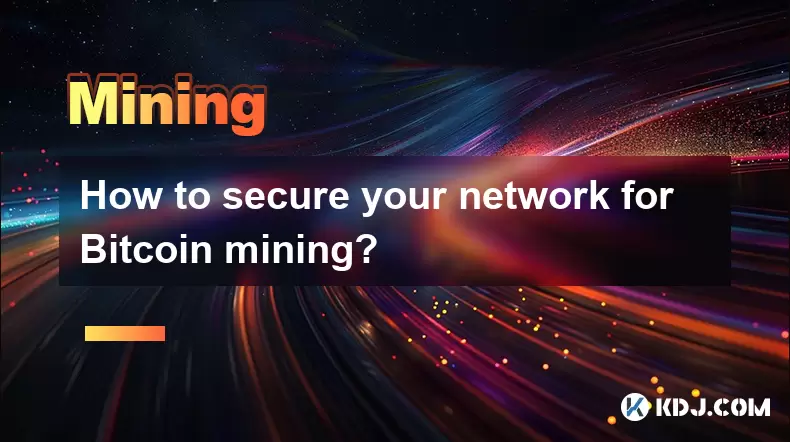-
 bitcoin
bitcoin $87959.907984 USD
1.34% -
 ethereum
ethereum $2920.497338 USD
3.04% -
 tether
tether $0.999775 USD
0.00% -
 xrp
xrp $2.237324 USD
8.12% -
 bnb
bnb $860.243768 USD
0.90% -
 solana
solana $138.089498 USD
5.43% -
 usd-coin
usd-coin $0.999807 USD
0.01% -
 tron
tron $0.272801 USD
-1.53% -
 dogecoin
dogecoin $0.150904 USD
2.96% -
 cardano
cardano $0.421635 USD
1.97% -
 hyperliquid
hyperliquid $32.152445 USD
2.23% -
 bitcoin-cash
bitcoin-cash $533.301069 USD
-1.94% -
 chainlink
chainlink $12.953417 USD
2.68% -
 unus-sed-leo
unus-sed-leo $9.535951 USD
0.73% -
 zcash
zcash $521.483386 USD
-2.87%
How to secure your network for Bitcoin mining?
Securing your Bitcoin mining network is essential to prevent cyberattacks, protect digital assets, and maintain operational integrity.
Jul 20, 2025 at 03:21 am

Understanding the Importance of Network Security in Bitcoin Mining
Bitcoin mining involves significant computational resources and network connectivity, making it a prime target for cyberattacks. Ensuring network security is crucial to protect both your mining hardware and the digital assets you accumulate. A compromised network can lead to unauthorized access, theft of mined coins, or even hijacking of mining power. The decentralized nature of Bitcoin does not exempt individual miners from taking responsibility for their own cybersecurity.
Securing your network starts with understanding the risks involved—such as DDoS attacks, malware injections, and man-in-the-middle exploits.
Setting Up a Secure Mining Environment
Before launching into mining operations, it's essential to establish a secure environment. This includes choosing a reliable internet service provider (ISP) that offers static IP addresses and minimal downtime. Your mining rigs should be isolated on a dedicated network segment if possible.
- Use VLANs or separate routers to isolate mining devices from personal or business networks.
- Implement strong firewall rules to restrict outbound and inbound traffic only to necessary ports and services like SSH, HTTP(S), and mining pool endpoints.
- Disable unused services such as FTP, Telnet, and UPnP on all network devices to reduce potential attack surfaces.
Using Virtual Private Networks (VPNs) for Enhanced Privacy
Deploying a VPN connection between your mining rigs and the mining pools adds an extra layer of privacy and security. It masks your public IP address and encrypts data transmitted over the internet, reducing the risk of eavesdropping or targeted attacks.
- Choose a reputable VPN provider that supports high-speed connections and has servers close to your mining pool locations.
- Configure the mining OS to route all traffic through the VPN tunnel, ensuring no leaks occur via DNS or IP addresses.
- Use split tunneling carefully if you want certain traffic to bypass the VPN, but always ensure mining-related communications are encrypted.
Implementing Strong Authentication and Access Controls
Unauthorized access to your mining software or management interface can result in catastrophic losses. Therefore, it's vital to enforce robust authentication mechanisms across all devices and platforms used for mining.
- Enable two-factor authentication (2FA) wherever available, especially for mining pool accounts and cloud-based mining dashboards.
- Use complex, unique passwords for each device and service, and rotate them periodically using a password manager.
- Restrict SSH access by allowing only specific IP addresses or ranges, and disable root login entirely.
Monitoring and Updating Network Defenses Regularly
Security is not a one-time setup; it requires continuous monitoring and updates. Threat landscapes evolve rapidly, and outdated firmware or software can leave vulnerabilities unpatched.
- Install intrusion detection systems (IDS) such as Fail2Ban to monitor suspicious activity and automatically block malicious IPs.
- Regularly update firmware on routers, ASICs, and mining operating systems to include the latest security patches.
- Log all network activity and review logs periodically for anomalies or signs of breaches.
Frequently Asked Questions (FAQs)
Q: Is it safe to mine Bitcoin over public Wi-Fi?A: Mining over public Wi-Fi is highly discouraged due to the lack of encryption and potential for eavesdropping. Always use a secured, private network with proper firewall settings when engaging in mining activities.
Q: Can I use a free or trial version of a VPN for mining?A: While some trial or free versions may work temporarily, they often come with bandwidth limitations, unstable connections, and weak encryption. For consistent performance and security, invest in a premium, trusted VPN service.
Q: How do I know if my mining network has been compromised?A: Signs of compromise include unexpected spikes in outbound traffic, unknown processes running on mining rigs, failed login attempts in logs, or sudden drops in mining efficiency without hardware issues.
Q: Should I use cloud mining instead to avoid network security concerns?A: Cloud mining removes the need for local network security but introduces other risks such as scams, lack of control, and dependency on third-party providers. Due diligence is required regardless of the mining method chosen.
Disclaimer:info@kdj.com
The information provided is not trading advice. kdj.com does not assume any responsibility for any investments made based on the information provided in this article. Cryptocurrencies are highly volatile and it is highly recommended that you invest with caution after thorough research!
If you believe that the content used on this website infringes your copyright, please contact us immediately (info@kdj.com) and we will delete it promptly.
- Crypto Crossroads: Bitcoin Price Reacts to Fed Jitters Amidst Shifting Sands
- 2026-02-02 05:05:02
- Justin Sun, Tron, Manipulation Allegations: New Bitcoin Strategy Meets Lingering Controversy
- 2026-02-02 05:05:02
- Bitcoin Eyes $77K as Michael Saylor Reaffirms Unwavering Conviction Amidst Market Swings
- 2026-02-02 05:00:02
- Altcoin Season on the Horizon? ETH, XRP, SOL, ADA Face Potential 184x Gains Amidst Shifting Crypto Landscape
- 2026-02-02 05:00:02
- Bitcoin ETF News: Latest Updates Drive Investment and Market Dynamics
- 2026-02-02 04:50:02
- Rare Royal Mint Coin Error Fetches Over £100: The 'Fried Egg' £1 Coin Phenomenon
- 2026-02-02 04:45:01
Related knowledge

How to Earn Passive Income with DePIN Mining? (New Trend 2026)
Feb 01,2026 at 12:40pm
Understanding DePIN Mining Mechanics1. DePIN mining relies on real-world infrastructure participation rather than computational hashing. Users deploy ...

How to Mine Vertcoin (VTC) on Your Gaming Desktop? (One-Click Miner)
Feb 02,2026 at 03:39am
Understanding Vertcoin's Mining Algorithm1. Vertcoin uses the Verthash algorithm, which is intentionally memory-hard and designed to resist ASIC domin...

How to Set Up a Quiet Mining Rig at Home? (Noise Reduction)
Feb 01,2026 at 11:00pm
Acoustic Enclosure Design1. Use rigid, dense materials such as MDF or acoustic-grade plywood for the enclosure walls to block mid-to-high frequency no...

How to Choose a Mining Pool with Lowest Fees? (Fee Comparison)
Feb 02,2026 at 02:39am
Understanding Mining Pool Fee Structures1. Pool operators charge fees to cover infrastructure, maintenance, and administrative costs. These fees manif...

How to Mine Bitcoin on Mac (M1/M2/M3)? (Software Tutorial)
Feb 01,2026 at 07:19pm
Understanding Bitcoin Mining on Apple Silicon1. Bitcoin mining relies on solving cryptographic puzzles using computational power, and Apple’s M1, M2, ...

How to Buy Used Mining Hardware Without Getting Scammed?
Feb 01,2026 at 08:00pm
Research the Seller's Reputation Thoroughly1. Check archived listings and feedback on platforms like Bitcointalk forums, Mining Hardware subreddits, a...

How to Earn Passive Income with DePIN Mining? (New Trend 2026)
Feb 01,2026 at 12:40pm
Understanding DePIN Mining Mechanics1. DePIN mining relies on real-world infrastructure participation rather than computational hashing. Users deploy ...

How to Mine Vertcoin (VTC) on Your Gaming Desktop? (One-Click Miner)
Feb 02,2026 at 03:39am
Understanding Vertcoin's Mining Algorithm1. Vertcoin uses the Verthash algorithm, which is intentionally memory-hard and designed to resist ASIC domin...

How to Set Up a Quiet Mining Rig at Home? (Noise Reduction)
Feb 01,2026 at 11:00pm
Acoustic Enclosure Design1. Use rigid, dense materials such as MDF or acoustic-grade plywood for the enclosure walls to block mid-to-high frequency no...

How to Choose a Mining Pool with Lowest Fees? (Fee Comparison)
Feb 02,2026 at 02:39am
Understanding Mining Pool Fee Structures1. Pool operators charge fees to cover infrastructure, maintenance, and administrative costs. These fees manif...

How to Mine Bitcoin on Mac (M1/M2/M3)? (Software Tutorial)
Feb 01,2026 at 07:19pm
Understanding Bitcoin Mining on Apple Silicon1. Bitcoin mining relies on solving cryptographic puzzles using computational power, and Apple’s M1, M2, ...

How to Buy Used Mining Hardware Without Getting Scammed?
Feb 01,2026 at 08:00pm
Research the Seller's Reputation Thoroughly1. Check archived listings and feedback on platforms like Bitcointalk forums, Mining Hardware subreddits, a...
See all articles










































































